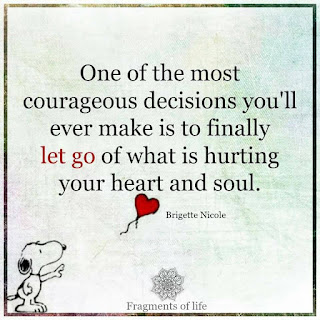Living apologetically I have been discovering is about the
things we avoid doing or are ashamed to admit to.
I have lived my life apologizing for having feelings that I
felt were bad or wrong.
It has taken me
this long to learn that having feelings, even the bad ones, is not the
issue. Those feelings are there to
protect me.
When I feel anger because I
have been wronged that feeling is there to alert me to the fact that something
is wrong with the person or the action that allowed that feeling to
surface.
When I feel hurt by the actions
of another, that feeling is there to serve to awaken me to the fact that my
personal safety boundaries have been violated.
When I feel sad it is because I
have been hurt by people or circumstances and my body is expressing sorrow for
having had to experience this event.
There is nothing to be ashamed about for feeling
feelings.
However I have been
conditioned by my life experiences and society that some feelings are bad and
need to be banished and replaced by the “good feelings”, happiness and enthusiasm and joy.
Those who promote this have done me a great
disservice for in neglecting what the emotions of anger and sorrow and hurt are
meant to warn me about what is “wrong” in a situation I have been untrue to
myself. I have failed to honour that
what I feel about a given situation is my birthright.
Feelings have a purpose. They are a sign of the conditions we are
experiencing. The so called “bad
feelings” indicate that there is something wrong, something dangerous,
something detrimental to my well-being in proximity. They should serve to tell me to “get out of
that situation”. Instead I was taught
that feeling those feelings meant there was something wrong with me! These are the false lessons that I learned:
- I was at fault for feeling hurt when someone else treated me badly.
- I was at fault for feeling angry when someone betrayed me.
- I was at fault when I was sad because someone harmed me.
How ridiculous is that!!??
I look at those statements written down on the page and realize that I
have been betrayed by those who taught me about feelings and that because of
that I spent years of my life betraying myself!
I said nothing to speak up for myself when my feelings were
trying to tell me I was in a disrespectful relationship. Instead I beat upon myself for being “too
sensitive”.
I lived my life apologizing
for having those feelings because I was conditioned to believe my feelings were
wrong!
This set me up to be a
doormat. I backed off when people
invaded my boundaries and the reason I backed down was because I had been given
the mistaken information that my feelings could not be trusted. People realized
that I would back down so they felt it was okay to mistreat me. It became a viscous circle. The more I backed down the worse I was
treated. The worse I was treated the more I hated myself for having those
angry, hateful, hurting vengeful feelings.
Of course the problem with always backing down is that
eventually you find yourself in a situation where there is nowhere to back down
to. You are on the edge of a cliff with
no rope to scale down. If you fall your
spirit will die, that spark of you that is you, the individual will be gone,
you will be only a puppet dancing to the desires and pleasures of others. That position is literally “do or die”. From that position you either cave and fall
or stand up and fight back.
I stood up and fought back.
For the first time in my life I listened to my hurt, angry, sad feelings
and heeded their message, they were telling me that I was in danger of losing
myself. I expressed my anger for the
first time in my life, not against myself, but against the people attacking
me.
- It was such a scary moment.
- It was a revolutionary and revelation-ary moment.
- It was the moment that changed my life and the future pattern of my life.
For in that expressing I lost those people who got joy out
of oppressing me. They turned against me
for daring to express my anger. I went
from being their door mat to being their scapegoat. When I would no longer do for them as they
manipulated me, I became the person to take the blame for their bad behaviour.
Gradually over the years of healing and coming to understand
myself and my reactions better I have learned that my feelings, especially
those of anger and sadness and hurt are my dear friends. They tell me when my boundaries have been
invaded and violated. They warn me of
dangerous manipulative people.
When I
feel that churning feeling in my gut that means these people mean me harm, they
want to control me, tell me what to think and how to behave for their benefit,
not mine. I now heed those warning signs.
I welcome them as friends who keep me safe. I will never again apologize
for feeling those warning feelings.
Renate Dundys Marrello
2016 – 03 – 30
Link to my Facebook Reflections Page
Link to my Facebook Reflections Page
photo credit - as marked or unknown
My journal blog entries are copyright.
My journal blog entries are copyright.
I love when you share my page to spread the word.
If you want to quote me I kindly ask that you please provide a link back to my page.
If you want to quote me I kindly ask that you please provide a link back to my page.





